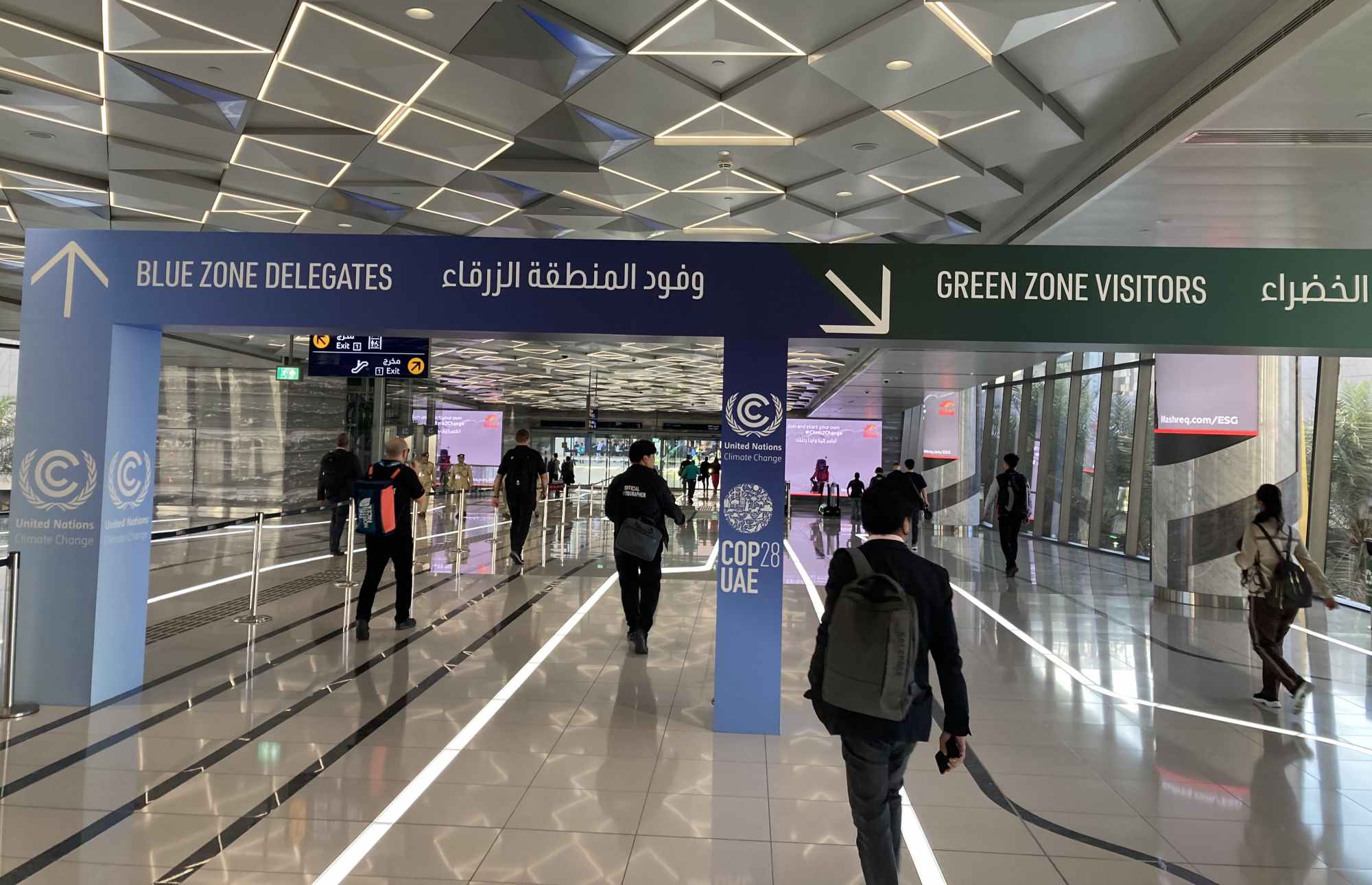
2023.11.30 – Picture taken from Fiona Spuler; entrance to the blue and green zone in COP28
Written by: Penny Coulthard, Charlie Davies, Niamh O’Callaghan, Matthew Paskin.
“Loss and damage must be delivered and actioned in Dubai,” COP28 President Sultan al-Jaber announced in his opening statement, putting this complex topic as a focus of this year’s conference.
The lead up to COP28 has been dominated by talk of a loss and damage fund that could help contribute to costs from the climate crisis. Hints and whispers have plagued news sites for weeks with reports by international news outlets showing that this could be the year that the whole idea comes together.
The agreement announced today includes the creation of the fund which will initially be hosted by the World Bank. Ambitious targets include headline money pots of $100bn a year available by 2030. The money will be used to aid developing countries most affected by climate change, such as small island states. $100bn is notably less that the growing $400bn projected as needed by the Unitarian Universalist Service Committee (UUSC). With the whole of COP28 set to be almost two weeks long, it is perhaps surprising that by the end of the ceremonial opening the parties have already reached an agreement on this thorny topic.
The delegates appeared to agree that the creation of this fund is the right and fair thing to do, with its announcement receiving a standing ovation. However, putting loss and damage into practice was always going to be challenging. Taking to the floor, the Co-Chair of the Transitional committee from Finland, tasked with making the fund operational, introduced the plan, recalling how this was not an easy journey, with parts they never wanted to experience again.
After a dramatic and unexplained pause in proceedings, the COP28 President opened the discussion to delegates and pledges for the loss and damage fund started to roll in.
With the feeling of a charity auction, the UAE started the bids with $100m – 0.1% of the total required to fill the fund, but a strong start none-the-less. Germany followed, matching the $100m and then the UK with its bid of up to $60m. At this point the fundraiser thermometer was barely showing, as John Kerry from the US stood up to give its pledge. He introduced their pledge by saying the fund is “based on cooperation and does not involve liability and compensation.”
“We pledge $17.5m” Kerry added. Social media exploded into a confused reaction – did he say $70.5m? Unfortunately not. “The scale of the challenge is too large for any government to finance alone,” Kerry concluded.
With the pledges made today amounting to under 0.5% of the $100bn goal, many of the more vulnerable countries took their opportunity to thank the donors for their pledges thus far. The delegate from Zambia highlighted “This is a good statement of intent. We therefore call upon all other developed countries because the fund has to be established and established at scale.” But is this enough?
A notable aspect of COP is the voice that it gives to parties that are rarely heard in other forums. Some of the world’s most vulnerable countries were keen to express the threats they are under. Türkiye highlighted how they are “particularly vulnerable”. According to the World Bank, their transport system is under significant threat from climate change, along with food and water security. Devastated by Typhoon Haiyan in 2013, the Philippines also raised their voice to emphasise the importance of working together as an international community; to transform something divided into something unifying. “Please keep the 1.5 alive” concluded the representative from the Maldives.
So, at the end of the day we have a loss and damage fund, albeit without enough money in it, and climate impacts getting worse and worse year on year. This is just the start of the process and the first day of COP28. Perhaps we should be encouraged that a decision has been reached on day one, something that has not happened at previous COPs. This bodes well for the other areas of focus such as reaching methane and fossil fuel emission goals. Given the urgency of the climate crisis, this quick decision making is what we need from current and future COPs.
Let’s hope that the funding thermometer fares better as the weeks proceed, or as the representative from Samoa put it, “This is an encouraging beginning but there is much work ahead of us. We have left the starting line.”

